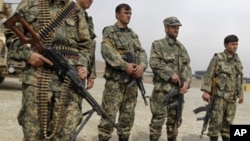In Afghanistan, reaction has been mixed to new U.S. public opinion polls indicating that a majority of Americans no longer support the war in Afghanistan. While anti-American sentiment in Afghanistan is on the rise, it is tempered by fears that a sudden pullout of foreign troops could plunge the country into civil war.
The increased American disillusionment over the continued U.S. military involvement in Afghanistan reflected in recent nationwide polls follows a period of turmoil in Afghanistan. The killing of 17 Afghan civilians by a U.S. soldier and the inadvertent burning of Qurans at an American military base have increased tensions and undermined trust between Afghan forces and their international coalition partners. The Quran burning incident set off a week of violent anti-American protests and attacks on international forces, and the Taliban suspended peace talks with the U.S. being held in Qatar.
The latest attacks on international forces occurred Monday, when an Afghan soldier killed two British troops in southern Afghanistan and a man believed to be a member of a local police force killed an American soldier in eastern Afghanistan
According to the U.S. Defense Department at least 80 NATO troops have been killed by Afghan security forces since May 2007.
The polls indicate the American public is growing weary of the decade-old war and a growing number of people want President Barack Obama to speed up the withdrawal of U.S. combat troops, which is scheduled to be completed by the end of 2014.
Many Afghans are also weary of the war and want U.S. soldiers involved in crimes and misconduct to be punished. But on the streets of Kabul, people like Ahmad Balal Zaland do not want international forces to leave Afghanistan prematurely.
“We don't want them to leave because they're the people who actually really help Afghan people and they are the main people who support Afghanistan,” said Zaland.
Sarwar Wazeri fears that if international forces leave now, it will lead to an all-out civil war involving the Afghan security forces, the Taliban and other ethnic and tribal factions.
He says there is still a lot of fighting going on in the country and if foreign forces leave, anarchy will certainly follow.
Despite the drop in American support for the war, President Obama and U.S. military leaders have reiterated their commitment to the 2014 timetable, which calls for gradually turning over portions of the country to Afghan security forces and maintaining a reduced military presence after that to provide support and stability.
Shukria Barakzai, a member of the Afghan parliament's defense committee, says neither the U.S. nor Afghanistan should should make long-term policy decisions based on temporarily inflamed tensions between the U.S. and Afghanistan.
“The Afghan public, also they are tired from everyday casualties, but this is not the time that we should go and choose on an emotional way," said barakzai. "We should think on a mature way how possible is and the consequence and the result of early withdrawal.”
She says both countries need to stay focused on what unites them - the need to fight al-Qaida and other Islamic militant groups, and to ensure regional stability.
News
Some Afghans Worry About Diminishing US Public Support for War
- By Brian Padden





